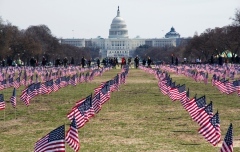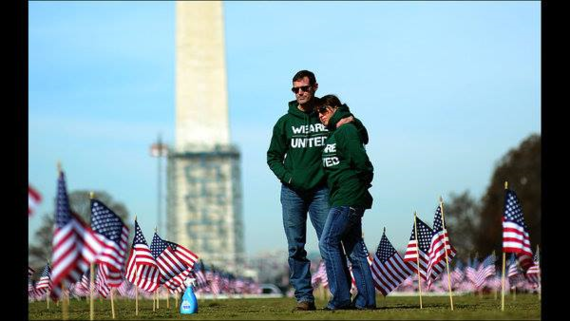As a counselor, I've had more training than most when it comes to the issue of suicide. But the truth is it scares me. Maybe it's because the consequences of failure are so severe. Perhaps it's because I know I don't have all the answers. Maybe it's just that I relate a little too closely to those who consider checking out for good -- I remember well what it feels like to lose hope. Whatever the reason, talking about suicide is really hard for me.
But I'm going to keep talking because we can't afford not to.
Since the first of the year, over 2,000 veterans have likely taken their own lives. This number is based on VA projections of 22 veteran suicides a day. For me and many of my fellow veterans, the number is tragic but not shocking. Since the VA first came out with its estimate in the "Suicide Data Report" two years ago the number 22 has been etched in our collective consciousness. Our brothers and sisters are killing themselves at the rate of almost one an hour. This is a problem that is intensely personal.
I'm not sure the rest of the country is paying attention. But they should be.
These were men and women who stood watch while our nation went about its business, blissfully unaware of their sacrifice. Through their service, they embodied the highest ideals of citizenship and service over self. They willingly raised their hands when others would not. For some, the cost of such selfless patriotism was extraordinary hardship and pain.
These individuals had so much more to offer. Responsibility, commitment, dedication, leadership all forged in the most challenging of environments.They represented an enormous reservoir of untapped talent our country desperately needs. But they killed themselves. And they continue to kill themselves at the rate of 22 a day.
What a profound waste.
If Americans understood how many veterans we lose to suicide, I don't think we'd tolerate it. As a nation we'd demand something be done. Maybe all we need for that to happen is a wake-up call.
Last month, Iraq and Afghanistan Veterans of America's (IAVA) launched its year-long "Campaign to Combat Suicide." I was proud to take part. The effort is in response to IAVA's annual membership survey that determines those issues most important to post-9/11 combat veterans. This year, the message from nearly 200,000 IAVA members around the country (including me) was loud and clear: America can no longer sit idly by while 22 of our comrades kill themselves each day. The cost of doing nothing is simply too great.
The first step in addressing the issue is letting people know the problem exists. IAVA members in Washington, DC and Dallas, Texas, held a "Day of Action" last Thursday planting American flags to symbolize the estimated number of veterans who have died by suicide so far this year. Both events were incredibly powerful.
Passersby were moved to tears by the sight of so many flags and the tragic ending they symbolized. In Washington, D.C., leaders from Congress, IAVA, and the Tragedy Assistance Program for Survivors (TAPS) framed the scope of the problem to the assembled crowd, most of whom had no idea. Media from around the country carried our message to millions more. I suspect many were both shocked and outraged.
In Dallas, IAVA leaders joined with representatives from the Dallas VA and the Veterans Resource Center to send a similar message. Attendees were moved by a local IAVA leader who shared his story of getting help to overcome suicidal thoughts and chart a new course in life. After his speech, 22 community members each added an additional flag to the display. These symbolized the estimated veteran suicides occurring on the very day of the event. Onlookers stood in stony silence, perhaps finally grasping the scope of this national tragedy.
We probably shocked them. But we also woke them up.
But raising the profile of this issue is only half the message. The more important piece is letting people know that getting help matters. People who get help can come back from the brink and find new motivation to live -- and live purposefully. Last week I saw this in the courageous testimony of several IAVA members who shared personal stories of overcoming suicidal thoughts. VA research backs this up with data showing those who receive care are less likely to re-attempt.
This message of hope is consistent with what I've experienced in my work as a counselor. For eight months last year, I volunteered to counsel incarcerated veterans at the Denton County Jail, many of whom were currently, or had been at one time, suicidal. With help, they developed new coping skills to counteract hopelessness and thoughts of self-harm. Today, I work at Equest Therapeutic Horsemanship in Wylie, Texas. Equest runs a veterans equine program called, "Hooves for Heroes." Although many of the participants who come to us are simply in search of fellowship and the joy of working with horses, some have bigger struggles. In the two years the program has been in existence, we've helped a number of veterans who considered killing themselves. But their experience at this amazing place helped them find new purpose and new hope. Sometimes, that's enough.
Whether help comes from the VA, private mental health professionals, or non-profits like Equest is less important than getting quality care for those who need it. It really can make a difference. This is central to IAVA's campaign.
Last week, IAVA unveiled a comprehensive set of policy objectives designed to ensure those who need help can get it. Increased access, expanded system capacity, higher quality, and continuity of care were all included. Within days, Sen. John Walsh of Montana announced his sponsorship of a bill encapsulating IAVA priorities. House representatives are busy drafting a companion bill. IAVA is calling on the president to issue a comprehensive Executive Order before Memorial Day, focused on combating veteran suicide. Momentum for action is building.
Slowing the rate of veteran suicide is not an easy-fix and it won't happen overnight. But it can be done. By raising awareness of the issue, demanding action from our elected leadership, and supporting organizations like IAVA, we can reverse this disturbing trend.
Or we can do nothing.


